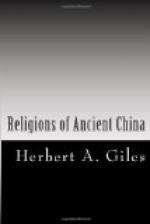Letter from God.—In A.D. 1008 there was a pretended revelation from God in the form of a letter, recalling the letter from Christ on the neglect of the Sabbath mentioned by Roger of Wendover and Hoveden, contemporary chroniclers. The Emperor and his Court regarded this communication with profound awe; but a high official of the day said, “I have learnt (from the Confucian Discourses) that God does not even speak; how then should He write a letter?”
Modern Materialism.—The philosopher and commentator, Chu Hsi, A.D. 1130-1200, whose interpretations of the Confucian Canon are the only ones now officially recognised, has done more than any one since Confucius himself to disseminate a rigid materialism among his fellow-countrymen. The “God” of the Canon is explained away as an “Eternal Principle;” the phenomena of the universe are attributed to Nature, with its absurd personification so commonly met with in Western writers; and spirits generally are associated with the perfervid imaginations of sick persons and enthusiasts.
“Is consciousness dispersed after death, or does it still exist?” said an enquirer.
“It is not dispersed,” replied Chu Hsi; “it is at an end. When vitality comes to an end, consciousness comes to an end with it.”
He got into more trouble over the verse quoted earlier,
King Wen is on high,
In glory in heaven.
His comings and his
goings
Are to and from the
presence of God.
“If it is asserted,” he argued, “that King Wen was really in the presence of God, and that there really is such a Being as God, He certainly cannot have the form in which He is represented by the clay or wooden images in vogue. Still, as these statements were made by the Prophets of old, there must have been some foundation for them.”
There is, however, a certain amount of inconsistency in his writings on the supernatural, for in another passage he says,
“When God is about to send down calamities upon us, He first raises up the hero whose genius shall finally prevail against those calamities.”
Sometimes he seems to be addressing the educated Confucianist; at other times, the common herd whose weaknesses have to be taken into account.
CHAPTER V — BUDDHISM AND OTHER RELIGIONS
So early as the third century B.C., Buddhism seems to have appeared in China, though it was not until the latter part of the first century A.D. that a regular propaganda was established, and not until a century or two later still that this religion began to take a firm hold of the Chinese people. It was bitterly opposed by the Taoists, and only after the lapse of many centuries were the two doctrines able to exist side by side in peace. Each religion began early to borrow from the other. In the words of the philosopher Chu Hsi, of the twelfth century, “Buddhism stole the best features of Taoism; Taoism stole the worst features of Buddhism. It is as though one took a jewel from the other, and the loser recouped the loss with a stone.”




